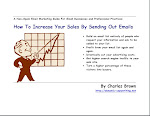Why Do Stories Succeed in Making Us See Past Our Own Biases?
Posted by Charles Brown at Saturday, July 26, 2008One of the things that happens to us as we go about our task of daily living, is that we build mental constructs of our world based upon how we interpret our experiences.
For example, I really struggled with my grades through high school and barely made it to college. I had the ability, but I lacked any belief in myself as a student.
This lack of belief was a construct I had created in my mind.
Annette Simmons, in her book, The Story Factor, illustrates another type of construct.
She was at a storytelling festival in 1992, standing next to a rough-looking man who illustrated the power of stories for her. When a young black man got up to speak, the rough-looking man uttered a racial epitaph under his breath, folded his arms in front of him and stared away from the speaker.
But as the young man spoke and told his stories, something changed. The rough-looking man became deeply involved with what the young man spoke about and ended with tears in his eyes.
In a sense, this man is like our would-be customers. They may have mental prejudices and filters built up as a result of things they've experienced. But a story can get through to them when no other form of communication can.
In my own story, it was hearing about other people who had learned to develop good study skills that inspired me and allowed me to believe that I too could become a good student. One movie in particular that influenced me was the Paper Chase, which was about a Harvard law student who spent hours and hours studying while falling in love with his hated professor's daughter.
It was the power of such stories that enabled me to radically transform my beliefs in my own abilities. I become a top student who was able to get into and succeed in law school, one of the toughest academic arenas there is.
Stories had broken through my construct that I was a poor student and helped me make a 180 degree turn in the opposite direction.
Have you ever had the frustrating experience of trying to counsel someone with a problem, who shot down every single solution you proposed? "I've tried that already," "That won't work in my case," or "I can't do that because ___."
Such a person has a construct that won't budge against logic, facts and reasoning. But tell that person a story about someone else in their situation and watch them listen. Watch them change like that prejudiced man Annette Simmons mentioned in The Story Factor.
I have a little secret to tell you. Whenever I've watched Spiderman or Indiana Jones in action, I tend to think I'm that character. I become that character while I am reading or watching the story. And even after that story is over, I tend to feel heroic.
What about your customers? What about the people who have built up constructs that don't let them see that what you offer is different? What stories can you tell that will help them see your solutions in a new light?
I would suggest that case studies - customer success stories about your other customers who were faced with big problems that were overcome because of your product or service, might be the big answer to how to communicate to these would be customers. Set aside your facts and logic for a while and just tell your marketplace stories.
COPYRIGHT © 2008, Charles Brown Add to Onlywire
Labels: case studies, storytelling



0 comments:
Post a Comment